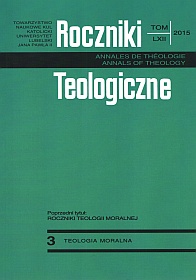The Problem of Argumentation in Moral Theology – the Essence and the Need of Modernization
Abstract
The exposition of moral theology devoid of adequate arguments for the presented theses will always be too superficial, cursory and not profound enough. This is why the task for theologians-moralists is to look for such ways of detailed arguments that would be adequate for the existing social and religious-moral situation. The traditional way of argumentation „from authority” today should be considered definitely insufficient, which, however, does not mean questioning its validity in general. Similarly, the strictly theological argument may not be rejected. However, faith and love should be treated in this argumentation not only as single duties, but as uniform principles integrating the whole morality. Justification of the theological type, because of the modern moral-social situation and the character of culture, however, has to be complemented with personalistic and pragmatic aspects, which may be aided by the adequate use of data coming from the so-called science of man. The „new” argumentation should also to a greater degree take into consideration the new meaning of some concepts and the specificity of the addressee's circles.
References
Autiero A.: Bioethik – global! Verantwortung in neuen Dimensionen. W: Verantwortung und Integrität heute: theologische Ethik unter dem Anspruch der Redlichkeit. Red. K. Hilpert, J. Sautermeister. Freiburg im Breisgau–Basel–Wien: Herder 2013 s. 177-187.
Berkenkopf Ch.: Sünde als ethisches Dispositiv: über die biblische Grundlegung des Sündenbegriffs. Paderborn [u.a.]: Schöningh 2013.
Böhm U.: Ist Werbung das Glück der Unzufriedenen? Religionspädagogische Zugänge zur beglückenden Werbung. W: Glück und Lebenskunst. Red. R. Englert. Neukirchen−Vluyn: Neukirchener 2013 s. 77-86.
Bołoz W.: Uzasadnienie norm moralnych w świetle prawdy o Bogu na podstawie nauki Soboru Watykańskiego II. W: W kierunku religijności. Red. B. Bejze. Warszawa: ATK 1983 s.195-204.
Bołoz W.: Współczesne sposoby uzasadniania norm moralnych. W: Veritatem facientes. Księga pamiątkowa ku czci Księdza Profesora Franciszka Greniuka. Red. J. Nagórny, J. Wróbel. Lublin: RW KUL 1997 s. 361-374.
Bucher A.: Glückliche Kinder und Jugendliche − Anachronismus oder Faktum? W: Glück und Lebenskunst s. 63-73.
Giertych W.: Rachunek sumienia teologii moralnej. Kraków: Wydawnictwo M 2004.
Greniuk F.: Teologia moralna w swej przeszłości. Sandomierz: Wydawnictwo Diecezjalne iDrukarnia w Sandomierzu 2006.
Hennings C.: Glück und Lebenskunst im Buddhismus. W: Glück und Lebenskunst s. 109-115.
Höhn H.-J.: Das Leben in Form bringen: Konturen einer neuen Tugendethik. Freiburg–Basel–Wien: Herder 2014.
Kieniewicz P.: Argumentacja antropologiczna w bioetyce. „Teologia i Moralność” 2011 nr 10 s. 25-40.
Kohler-Spiegel H.: „Glück” im Märchen. W: Glück und Lebenskunst s. 96-108.
Kos E.: Glück und Moral. W: Lebensfragen: Festschrift für Gerfried W. Hunold. Red. G.Droesser, M. Hartlieb. Frankfurt–Bern–Wien [u.a.]: Lang 2013 s. 67-88.
Kuch M.: Richtig handeln: Glaube und Ethik. Leipzig: Ev. Verl.-Anstalt 2014.
Kunstmann J.: Christliche Lebenskunst Eine Anforderung. W: Glück und Lebenskunst s.123-130.
Leeten L.: „Placing oneself in the world”. Moralische Verständigung als performative Lebenspraxis bei Stanley Cavell. W: Moralische Verständigung: Formen einer ethischen Praxis. Red. L. Leeten. Freiburg–München: Alber 2013 s. 145-167.
Lutz R.: Sinngründe als genuine Handlungsgründe. Die Sinnfrage und ihre theologisch-ethische Relevanz für die Motivationsproblematik. W: Lebensfragen: Festschrift für Gerfried W. Hunold s. 89-102.
Machinek M.: Biblical anthropocentrism? About (over)using the Biblical arguments in the contemporary bioethical discussion. „Gemellological Review” 4:2003 s. 57-65.
Machinek M.: Typy argumentacji etycznej w dyskusji o dopuszczalności eksperymentów na ludzkich embrionach. „Studia Warmińskie” 40:2003 s. 83-105.
Machinek M.: Znaczenie argumentacji teologicznej w sporach dotyczących bioetyki. „Diametros” 19:2009 s. 66-77.
Meyer-Blanck M.: Lebenskunst und christliche Tradition. W: Glück und Lebenskunst s.131-139.
Müller P.: Viel Glück und viel Segen. Das Reden vom Glück in der Bibel. W: Lebensfragen: Festschrift für Gerfried W. Hunold s. 40-50.
Nagórny J.: Teologia moralna. W: Jan Paweł II. Encyklopedia nauczania moralnego. Radom: Polskie Wydawnictwo Encyklopedyczne POLWEN 2014 s. 537-543.
Pinckaers T.: Źródła moralności chrześcijańskiej. Jej metoda, treść, historia. Tłum. A. Kuryś. Poznań: W drodze 1994.
Pryszmont J.: Historia teologii moralnej. Warszawa: ATK 1987.
Regenbogen A.: Glück als Wertmaßstab und als Lebensziel. W: Glück und Lebenskunst s.51-62.
Roth M.: Macht Glaube glücklich? W: Glück und Lebenskunst s. 31-39.
Schockenhoff E.: Grundgebot Liebe: Wege moralischen Argumentierens. https://www. erzbistum-koeln.de/kultur_und_bildung/schulen/religionsunterricht/steinfeld-tagung/vortraege/2013/Schockenhoff/Prof._Schockenhoff_Ethik_Grundgebot_Liebe_-_Wege_moralischen_Argumentierens.pdf (dostęp: 30.09.2014 r.).
Schockenhoff E.: Grundlegung der Ethik: Ein theologischer Entwurf. Freiburg im Breisgau–Basel–Wien: Herder 2014.
Schöpsdau W.: Wie der Glaube zum Tun kommt: Wege ethischer Argumentation im evangelisch-katholischen Dialog und in der Zusammenarbeit der Kirchen. Göttingen: Vandenhoeck & Ruprecht 2004.
Schröder B.: Glück + Lebenskunst = Segen? W: Glück und Lebenskunst s. 197-210.
Virt G.: Zur Ethik der Ethikkommissionen. W: Verantwortung und Integrität heute s. 246-257.
Zirfas J.: Glück als Erziehungsziel? Pädagogische Gedanken zum Kinderglück. W: Glück und Lebenskunst s. 21-30.
Copyright (c) 2015 Roczniki Teologiczne

This work is licensed under a Creative Commons Attribution-NonCommercial-NoDerivatives 4.0 International License.





